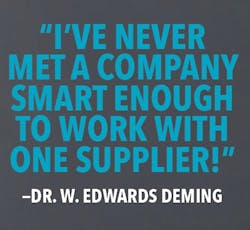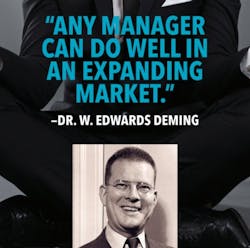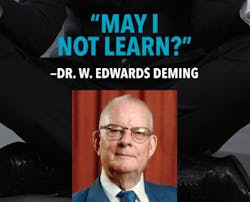Why Dr. W. Edwards Deming Never Gets Old
Twenty-nine years ago this month, as the newly hired corporate-level vice president of quality for a top-five national builder, I presented to the annual meeting of VPs and directors of construction and purchasing from across the country. I showed them a remarkable video of Dr. W. Edwards Deming addressing purchasing issues and how they affect production and quality in a variety of industries. I pulled several quotes from the Deming video to launch a discussion that would lead to shared group learning and began with one of my favorites, “I’ve never met a company smart enough to work with one supplier!”
I broke the audience into small groups to discuss what the idea meant to them, the application to home building in general and, more specifically, their local operation. What I expected was a reasoned debate on insights and applications of Deming’s admonitions on builder/supplier relationships. What I heard instead, with a few notable exceptions, ranged from lack of interest to annoyance to anger bordering on paranoia. Over time, those exceptions” turned out to be my greatest allies during what turned into a nine-year-long “campaign for quality” I had just commenced with that firm. On that day, though, to say I was disillusioned would be putting it mildly.
The first team to report back was dominated by a vocal VP from out west who always thought corporate was “up to something.” I later learned that historically, this was not an unreasonable suspicion, but I had been on the job all of six weeks. A bit of a conspiracy theorist, the VP adamantly declared this “Deming stuff” was part of a ploy to dictate sole-source supply controlled by corporate. The reality was no one at corporate had ever mentioned Deming, save the new guy in town, but no matter. What was to be his brief, two- to three-minute report on his team’s discussion morphed into a protracted lament on how the field was not about to give up their autonomy, that sole sourcing flew in the face of everything he had learned in 30 years on the job, and only a fool with no real home building experience would consider it. Since I was new to home building, new to the company, and had the gall to show this video, well, his conclusion was obvious.
Having now been declared the fool, I was not in a good position to cut him off. I was forced to let the VP go on far too long, telling anecdotal war stories about how various people he knew had been burnt badly by a sole source and would never do it again. Although I later determined there was not a single division, including his, that did not have at least a few sole sources for material and/or labor and some had eight or ten, the subsequent team reports were subdued, and the hoped-for great debate failed to materialize. In short, I fairly well bombed at my first big meeting. Bets were taken on how long I would last in the company. Ironically, the next week I received five requests from field divisions—led by those notable exceptions mentioned above—for me to come out and work with them to explore ideas to improve purchasing practices.
The Doctor Is In
I have used that Deming quote countless times over the years to get builders to stop and think about their approach to purchasing and construction. Each of the many times I heard Deming make that statement live or on video, he always placed heavy emphasis on the “one,” as in, “I have never met a company smart enough to work with ONE supplier.”
Is the good doctor really suggesting sole sourcing? Say it ain’t so! How are you going to keep suppliers and trades honest, right? Whenever I hear that, I wonder how they’re going to keep the builders honest, but that’s another column. A thorough study of most other major industries in this country—you know, those that have far outpaced home building in productivity gains—leads to an inarguable conclusion. In the most productive, the strategy of sole sourcing where practical and otherwise significantly reducing sources for both labor and material whenever possible is not just a trend but an inviolate principle. My old VP friend three decades back would have called these companies naïve, even ignorant or just plain dumb, but the last laugh is owned by those outside of home building.
Of course, sole or limited sourcing cannot be done casually or without eyes wide open. For some trades and suppliers in some markets, it is not even an option. It requires a well-developed set of criteria based on total cost, not bid price alone. It’s all about simplification, measurement, and control and goes a long way to mitigate the issues cited in my recent four-article series, “The Nightmare Called Variance.” (See the August, October, November, and December 2017 issues of Professional Builder.) But if you do not have the will or skill to get all the information you need to determine total cost, then by all means maintain your low-bid tactics (we cannot call that a strategy) and have at it. The money you leave on the table will be picked up by a competitor.
Photo: courtesy the W. Edwards Deming Institute
In the January 2018 issue of Pro Builder, I decided to start the year on a higher level of operating philosophy after the last six columns of 2017 were right down at the nitty-gritty street level. Going back to Dr. Deming and his teachings seemed the perfect way to do that and as I wrote the January piece, I kept recalling how just one Deming quote, as simple as it might initially seem, can provoke an individual or a team to greater and deeper consideration of a variety of issues in home building. What better one could I pick following the “Nightmare Called Variance” series than the quote featured here, “I have never met a company smart enough to work with one supplier!” To work out a Deming lesson such as this, you first push to uncover every possible explanation for what he is trying to tell you. Deming was very much a Socratic method teacher, an approach that our instant answer, 10-step-list, read-the-will culture does not have enough patience for these days. Deming asks the questions, requiring you to think and make the applications to derive the right answer for your company in each situation. Is that really too much work to get it right?
Photo: courtesy the W. Edwards Deming Institute
Work With a Single Supplier ... Really?
So try this with your team. Make them struggle with the challenge. Are we really not smart enough to work with even one supplier or trade? What is the evidence for and against? Which of our daily operating practices show we are smart enough—and which do not? What would our suppliers and trades say, presuming they’d be brutally honest? How about we ask them? If you are ready to give your firm a gold star here, can you—right this instant—present your detailed criteria for calculating total cost?
If you don’t have that and can't prove you continually use it, with data, instead of mere bid price, then indeed, you are not smart enough to work with one supplier or trade, let alone multiple in each category. And harkening back to the VPO column series, can you demonstrate specifically how you calculate the overhead factor—both yours and your suppliers’ and trades’—for each occurrence of variance? If not, you’ve got some work to do. Can you show me the specific incidence and cost of warranty work for each supplier and trade for the past three years? No? Then back to school.
Just because we get things done after a fashion and make some cash does not mean we are doing things right—sometimes nowhere near so. Another Deming quote applies here, “Any manager can do well in an expanding market.” Be honest. Does this describe you? What if we took the capital invested in your operation and put it in the S&P 500? Would you beat it? Are you sure? Take an honest assessment of just how smart you and your team are and resolve to take it to another level this year. Don’t let pride get in the way. It’s hard to admit we need help. Let’s close with a final quote from Dr. Deming that he loved to say when someone informed him or challenged him in a way that caused him to self-examine one of his own positions. He would look at the group, open his arms palms up, and in a mock-pleading voice say, “May I not learn?” Yes, even the great Dr. Deming was always learning, even into his 90s and remained that way till his dying day. I’m guessing you’ve got a few good years left. Don’t miss any chance to learn today and each day from here onward.
For links to free PDFs of Scott’s articles about bridging the margin gap, solving the trade shortage, or tackling variance, email [email protected].




